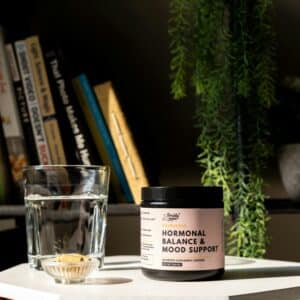 Female hormones can affect both inflammation and autoimmune diseases. I know most of us don’t equate estrogen and progesterone to anything but managing our menstrual cycle and making our lives hell during perimenopause and menopause. But, these hormones can cause issues for autoimmune diseases too. Today I’m going to scratch the surface on these hormones and why they are linked to autoimmune diseases.
Female hormones can affect both inflammation and autoimmune diseases. I know most of us don’t equate estrogen and progesterone to anything but managing our menstrual cycle and making our lives hell during perimenopause and menopause. But, these hormones can cause issues for autoimmune diseases too. Today I’m going to scratch the surface on these hormones and why they are linked to autoimmune diseases.
What are Helper T Cells?
Before we begin to discuss hormones, it’s important to review the role of helper T cells in autoimmune diseases. Helper T cells are white blood cells that send signaling chemicals, like cytokines and interleukins, to the immune system to generate a response. There are a few different types of these T cells, and maintaining balance between the responses is key for keeping the immune system functioning. In the cases of some autoimmune disease, the messaging between T cells types becomes unbalanced, and a dominance develops between the types of helper T cells.
Th1 cells are cells that secrete IFN-gamma and IL-2 that promote cell-mediated responses to bacteria, viruses and pathogens within cells. They promote cellular immunity tend to be pro-inflammatory. Th2 cells are cells that release interleukins 4 and 13 and help with antibody-mediated responses against bacteria, allergens, toxins and parasites outside of the cell.
Autoimmune diseases can arise when the Th1 and Th2 responses become unbalanced. We call these either Th1 or Th2 dominant conditions. Rheumatoid arthritis (RA), multiple sclerosis (MS), Type 1 diabetes, Hashimoto’s and psoriasis are all Th1 dominant conditions. Th2 dominant conditions include systemic Lupus Erythematosus (SLE), Sjogrens syndrome, asthma and eczema.
It’s important to note that these T helper cells actually influence another important T helper cell called Th17. Th17 are the actual drivers of autoimmune cellular damage. Th1 dominance slows down or stops Th17 from activation, and Th2 dominance increases the Th17 activation.
Helper T Cells & Estrogen
Now let’s get to the hormones. The main female sex hormones are estrogen and progesterone. Estrogen is a steroid hormone that is responsible for the female sex characteristics. It has several roles in the body that goes way beyond regulating our menstrual cycle. Estrogen is important for bone and heart health, it affects our blood sugar levels, collagen production, brain function and is a potent anti-inflammatory agent.
Estrogen also has an impact on the immune system. It can actually inhibit Th1 pro-inflammatory cytokines, which is beneficial for those Th1 dominant autoimmune diseases. On the other hand, estrogen can stimulate the production of Th2 cytokines, which is not beneficial for those Th2 dominant conditions. In other words, low estrogen levels can negatively impact conditions like RA, MS, Hashimoto’s, and positively impact conditions like SLE and Sjogrens.
What About Progesterone?
The other major female sex hormone is progesterone. Progesterone is another steroid hormone that prepares the uterine lining for implantation of a fertilized egg. Progesterone levels rise throughout pregnancy. During perimenopause this hormone eventually declines until ovulation stops. Progesterone also helps improve your mood and can influence sleep.
In terms of inflammation, progesterone is a great anti-inflammatory agent. It has a direct impact on the immune system and can activate the Th2 cytokines to fight inflammation. Progesterone may also work on lowering mast cell activation and other types of allergic reactions.
What Can I Do About My Hormones?
The hormonal influence on autoimmune diseases can be another way to manipulate and treat your underlying condition. I know for me, I had basically exhausted all root causes and was still having issues, until I addressed my hormones. As someone who is in perimenopause, the dramatic swings in my estrogen and progesterone were causing a lot of joint issues. Once I figured this out, the severity of my flares lessened over time and eventually disappeared.
The first step is to find a practitioner who is knowledgeable about hormones and autoimmune diseases. This may be an OBGYN, naturopath or functional doctor trained in women’s health. Second, get testing done. Hormone testing is not super accurate, but it’s good to get an understanding of your hormones and how you are metabolizing them. The DUTCH test is a great option for this. Third, if your hormones are not balanced, consider using alternative methods to balance them out or hormone replacement therapy. I tried both, and HRT has been my saving grace.
If you need help figuring out your next step, please contact me to book a free discovery call. Additionally, check out more information about autoimmune diseases and nutrition and lifestyle tips on my Instagram, Facebook and YouTube feeds.


